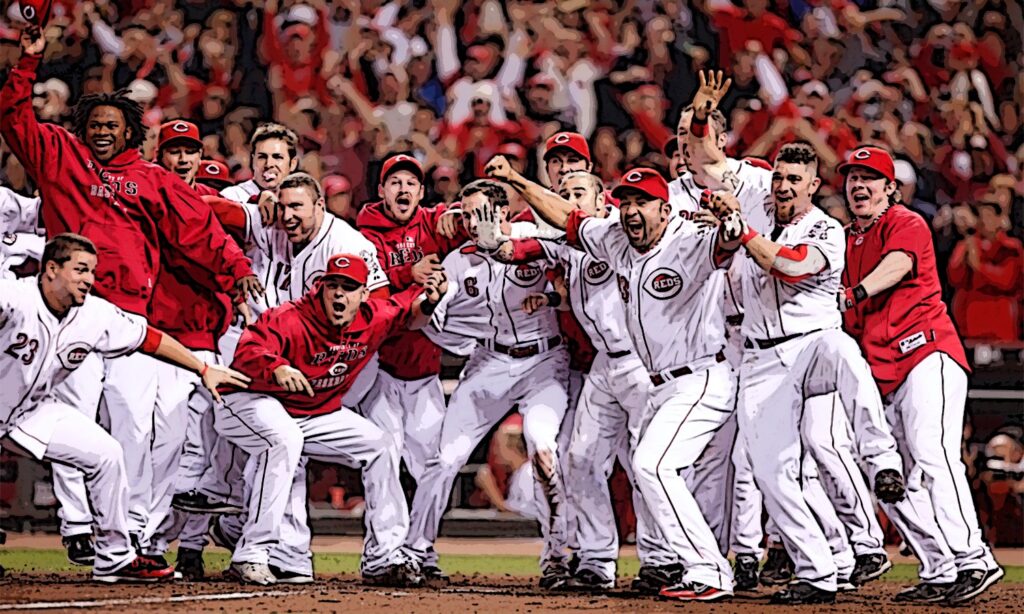One of the first things you learn about baseball is that the games are 9 innings long made up of six outs each.
But there are exceptions to this rule.
The first one that comes to mind is when the score is tied after the 9 innings are complete.
Since games cannot end in ties, especially in the MLB, teams go on to play extra innings.
The other exception is when the home team is leading in score and the opposition has run out of chances at-bat.
Note that the home team is positioned to bat at the bottom of every inning. Basically, they get the final say in every game.
So, if the visiting team can’t score enough runs to tie the game or take the lead in the 9th inning, they’ll be handed the loss.
There’s no need for the home team to hit as they could simply add insult to injury.
There is one more exception that comes to mind. It’s when the home team wins the game midway in the final inning of a game.
The last run that ends the game suddenly is always followed by a walk-off.
What is a Walk-Off in Baseball?
A walk-off is a term used in baseball to describe a game-ending play in which the home team scores the winning run. Following the run, the home team simply “walks-off” the field immediately without the need to complete the inning. Walk-offs can only occur at the bottom of every inning, starting from the 9th and on.
In fact, I’d say the term “walk-off” applies to the visiting team just as equally.
If anything, the visiting team would likely walk-off the field in disgust, while the home team will celebrate the game-winning run.
The pitcher is usually the angriest as he’s the one who threw the game’s final pitch for the loss.
I can’t help but think he’d want a gimme on that pitch and starts playing “what if” scenarios in his head.
And this happens despite the run not being entirely his fault. It could have come from a fielding error from his teammates.
How Common are Walk-Off Victories in Baseball?
It’s hard to gauge how many games end with walk-off runs, considering it’s not a general stat that Major League Baseball tracks.
My bet is that this happens routinely and is more common when games reach extra innings.
Just imagine that a home team victory in extra innings always precedes a walk-off.
To give you an idea of how common walk-offs are, 250 of them were achieved by grand slam home runs alone.
You are in for a treat when witnessing a grand slam anytime during a match. The walk-off grand slam is extra special.
That’s because in one fell swoop, not only do you drive in a single-play maximum of 4 runs, but you end the game then and there.
No better way than to walk-off in style.
Most Walk-Off Hits in MLB History
As you can imagine, the players with the most walk-off hits are some of the most popular sluggers of all-time.
The logic is quite simple.
As a power hitter, you’re more likely to achieve a walk-off by means of a home run or by driving home a baserunner.
Players with less power will seldomly hit home runs or drive-in a run unless the baserunner is already on second or third base.
That said, let’s take a look at list and their walk-off count:
MLB Record for Most Walk-Off Hits
| Player Name | Walk-Off Hits | |
|---|---|---|
| 1 | Jim Thome | 13 |
| 2 | Babe Ruth | 12 |
| 3 | Mickey Mantle | 12 |
| 4 | Stan Musial | 12 |
| 5 | Jimmie Foxx | 12 |
| 6 | Frank Robinson | 12 |
| 7 | Albert Pujols | 12 |
| 8 | David Ortiz | 11 |
| 9 | Tony Perez | 11 |
| 10 | Ryan Zimmerman | 11 |
The most memorable walk off for me and probably many fans was from none other than Joe Carter in the 1993 World Series.
Granted that I’m Canadian and Joe Carter was playing for the Toronto Blue Jays, it made me feel a sense of pride for my country.
As a quick history lesson, the Blue Jays were trailing 6-5 in the ninth inning to the Philadelphia Phillies.
With two runners on, Joe Carter hit a walk-off home run on an 2-2 count.
Carter helped the Blue Jays both win the game 8-6 and the World Series Championship.
Not only was it just the second time in MLB history a player hit a walk-off home run to win the World Series, but the one and only while trailing in the score.
“Touch 'em all Joe, you'll never hit a bigger home run in your life!”, quoted by Legendary Radio sportscaster Tom Cheek.
Final Thoughts
The way I’ve always visualized baseball is that my team is never under threat while at-bat.
Obviously, if the opponents are ahead in the match, it’s up to my preferred team to close the deficit and take the lead.
But so long as my team was at-bat, the opposition couldn’t do any additional damage on the scoreboard.
I viewed the game from a defensive perspective. That’s because I was a fan of the Montreal Expos growing up.
All I remember is the franchise having a limited team budget and young superstars who left for higher pay when opportunity presented itself.
In any case, if the Expos were tied and going to bat in the bottom of the 9th, I saw at as a freeroll shot to win the game.
Meanwhile, it was more of a nail biter when they were behind in score.
From memory, I don’t recall too many walk-off runs on their part. It was mostly disappointment and frustration.
That said, I’d probably get a sense of relief from a walk-off run knowing the game is now over.






